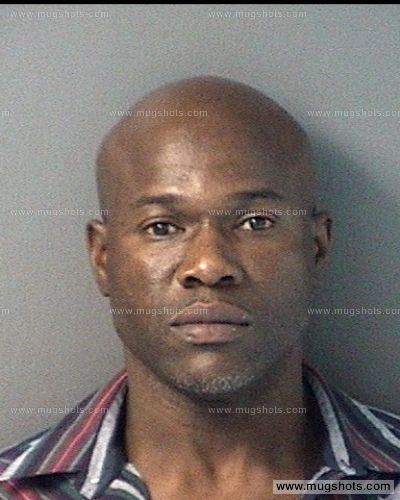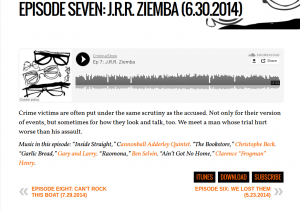My client’s name isn’t important so we’ll call him C.H. He was minding his own business in Pensacola, Florida when he was arrested. The police claim he’d mugged several people in town over the previous week.

One of the purported victims was peculiar. He wasn’t peculiar by virtue of his long hair or beard. Nor was he peculiar in that he was wandering the dark streets alone at night with no real destination in mind.
He was peculiar because he doesn’t remember being knocked out, he doesn’t know who knocked him out, and he doesn’t know how he was knocked out. Yet, after admitting he couldn’t identify who did it, he blames C.H.
Nobody else can put C.H. and the victim in the same area of town on the same night. Nobody knows exactly what happened when the victim blacked out. If it weren’t for a mug shot on a wanted poster stuck to a light post, C.H. would never have been charged.
That guy in the mugshot looks guilty.
That mugshot didn’t get there on accident, either. When another person was attacked on a different day the police (under circumstances we know little-to-nothing about) pulled out a mugshot to have that victim attempt to identify her attacker. Despite the well-known unreliability of police lineups, despite the overwealming unreliability of cross-racial identifications, and despite some of the latest advances in eyewitness identification offering no additional reliability, the police plastered the town with mugshots of C.H. and implicated him in terrible acts.
When the victim saw one he decided, for the first time, that he could identify his attacker.
It’s been twenty years since I personally served on a jury, but even before I was a lawyer I’d say the case against C.H. isn’t the best. Could the prosecutor win? Possibly. Could he lose? For sure.
It’s hard to believe a witness pointing at defendant in open court saying, “that’s the guy, I’ll never forget his face” when the first time the witness was asked about it he said he couldn’t remember any face. When that’s your best evidence, you really can’t fault a jury for finding that the government didn’t prove C.H. is a criminal.
C.H. isn’t really a client of mine.
He’s the subject of episode 7 (“J.R.R. Ziemba) of Criminal. The episode recounts the story of J.R.R.- a late-evening stroller who encounters a man late at night before, presumably, being knocked out (he says he doesn’t know what happens) and mugged.
The podcast tells the story from his viewpoint. It’s got a different spin than what I’ve written here but the important facts are the same. He doesn’t know what happened (“He asked me what time it was, and that’s literally the last thing I remember…“), he told the police he couldn’t identify the man he’d encountered on the street, then he contacted the police only after seeing a wanted poster on the street. He went to trial, and lost.
The prosecutors also called him as a witness to tell his story against C.H. in other trials. The prosecutors lost those, too. I’m not surprised by that, either.
Yet when you listen to the show, the story is one of bewilderment. J.R.R. has reasons he told the police he couldn’t identify C.H. You hear them in the podcast. At the end of it all, you’re left wondering how the trials could have failed such a reasonable victim.

The podcasts attempts to resolve this by talking about J.R.R.’s appearance, his potential quirkiness, or the potential homophobia of the jury. The podcast doesn’t talk about the difficulties of eye-witness identification or the rules and burdens of court. The prosecution doesn’t talk about that pesky 6th Amendment and the right to subject the victim to “scrutiny” (or, “cross examination” as we call it).
I’m not saying they should have interviewed a defense attorney to tell the other side of the story. After-all it is J.R.R.’s story and he likely doesn’t know those things.
I am saying that Criminal podcast is well produced, does a great job at telling stories and, at least in this episode, is unfair.

This is interesting. Your blog entry is reasonable but I think you missed the point of the podcast. Did Mr. Henry receive a fair trial? Yes I think so. Was there enough evidence to convict him? Obviously not. If anyone should feel insulted by my admittedly subjective account, it is the state attorney’s office not Mr. Henry and certainly not you. That said, I’m not sure that you appreciate the trauma that being sucker-punched unconscious affords one. Again, my criticism would be directed to the police officer who asked a half-conscious punch drunk man any questions which might come up in court.
Also, I’d like to say that if you think that I do not appreciate the fallibility of eye-witness testimony and mugshot line-ups then you didn’t listen closely to the podcast. Please know that I am pleased with the outcome of the case. Not because I think that Mr. Henry is innocent but because it was not possible to prove it in court. It makes me feel kind of patriotic actually, that the system worked (sort of).
Also, you seemed cool. Take care, man!
Mr. Ziemba,
Thanks for weighing in. All of what you’re saying makes sense (especially the cops asking for identification at exactly the wrong time- unfortunately that’s how they’re trained).
A lot of what I’ve written is really directed more at how the story was put together. The tone of the episode (which, like I said, is actually an engaging story) leads the audience to feel as though you’d been failed… Not that that’s necessarily your opinion of the experience (or that you were lodging some kind of complaint… although I did feel bad for you having to keep getting dragged back into it).
My comments regarding eye witness ID’s weren’t necessarily directed at you. Despite the well-researched and publicized problems with them, they’re still generally regarded by the public (and juries) as reliable evidence- no matter how the identification is conducted. I’m guessing that, at this point, you’re as aware as anybody at the problems that can pop up in court.
Anyhow, I appreciate you taking the time to read this. Hopefully you weren’t left with any lasting impact from being knocked out!
I understand your perspective, but I take issue with one thing. I get that victims are subjected to cross-ex. It’s literally the only way to do a fair trial. But i don’t quite let defense attys off the hook here. His sexuality has ZERO to do with anything. We use ‘right to a fair trial’ as an excuse to further batter victims. Why does a rape victim get asked about her drinking habits? Why is she asked about how much sex she has with her boyfriend? Why is a victim of assault asked why they were walking down a certain street? The whole point is to discredit the victim. But what are you really doing? You are really saying ‘My client might have done this, but even if he did…didn’t he/she sort of ask for it?’
Look at the Brock Turner case. The man was caught red handed by two non-drunk men as he was assaulting his victim. Why, then, does his attorney ask the victim how much she drank, and if she liked to party? Literally what would those answers have to do with him assaulting her? The answer is: nothing. These are scare tactics, punishments for coming forward.
“His sexuality has ZERO to do with anything.”
I’m not sure what this reference is to, exactly. Did you listen to the podcast? I never made reference to his sexuality other than to describe how it was dealt with in the way the podcast was produced.
“Why does a rape victim get asked about sex with her boyfriend?”
Thanks for asking. Victims (in all cases) and witnesses in all cases can be cross examined on their ability to remember exactly what they are testifying to. Drugs and alcohol may affect somebody’s ability to remember. So the general rule that’s been on the books for eternity is that when somebody takes the stand you can ask them about their drug or alcohol use.
“Why does a rape victim get asked about her drinking habits?”
Thanks for asking again, but they can’t. It has been prohibited by 725 ILCS 5/115-7 for a long, long time.
Your questions about the Brock Turner case may or may not be fair. I honestly don’t follow legal news enough to know any of the particulars. But, again, I would say that drinking and partying can affect an ability to recall in the right context, so there is actually more to it than what you’d call “scare tactics.”